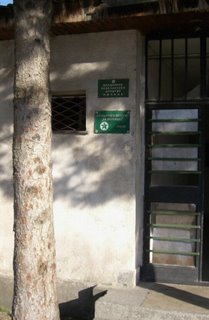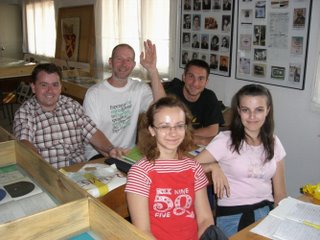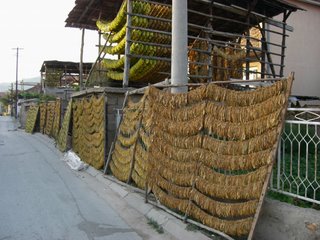Skopje to Prilep
Had a quick beer for breakfast then caught the bus to Prilep. It was a pretty small bus and pretty uncomfortable. At one stage we were pulled over by the police and had to sit in the heat for ten minutes while he got booked or something.
Prilep is certainly a pretty remote town. About 70,000 people with a few Esperantists among them. After checking into our hotel (the best room of the trip so far), I gave one of the Esperantists a call and within ten minutes he and his father were at our hotel.
Had a bit of a chat with the son while his father went off to take the Esperanto class. There just seems to be such a gap now between western European Esperantists and places like Prilep. The big pity is that fellows such as this bloke in Prilep are such passionate Esperantists and they have students but it's hard to keep them inspired because people just don't have the money to travel, which should be one of the main points of Esperanto.
Door to the Esperanto club.

Today was Esperanto class day and we got a tour of their phenominal Esperanto library and museum of Esperanto memorabilia. This stuff deserves to be in a proper museum. There was even a picture there of another Australian that had visited, who also happens to be just about the only Australian Esperantist I've met - Marcel.
I managed to get a photo of the Esperanto class. That's looks like a pretty eager student down the back. Looks like he's keen to show he knows the answer.

Turns out Prilep's main industry is the preparation of tobacco. You can't go very far in Prilep without seeing tobacco hanging out to dry.

It really is everywhere. The leaves are threaded onto string then hung up in the sun for a week or so. So every leaf gets handled individually a couple of times in the process of making tobacco. With that sort of intensive labour involved, just imagine how much cigarettes are going to cost once they start paying these people a proper wage.
After Esperanto we went to the house of one of the students ...

... and had a drink of home-made loza with the girls father while discussing the process of making tobacco. Like just about everyone else in town, they too go out into the fields, pick tobacco, take it home to thread onto string then hang it up to dry outside at home. The next day they were off to bring home some more tobacco.
Later we got a bit of a tour through the centre of town. I know this is going to sound familiar, but the place is packed at night. Just like Nis and Skopje - the streets are packed in the evening. People just love to wander about at night or sit around with a drink and chat. Obviously part of the culture. And it helps to have streets designed for it.
Prilep is certainly a pretty remote town. About 70,000 people with a few Esperantists among them. After checking into our hotel (the best room of the trip so far), I gave one of the Esperantists a call and within ten minutes he and his father were at our hotel.
Had a bit of a chat with the son while his father went off to take the Esperanto class. There just seems to be such a gap now between western European Esperantists and places like Prilep. The big pity is that fellows such as this bloke in Prilep are such passionate Esperantists and they have students but it's hard to keep them inspired because people just don't have the money to travel, which should be one of the main points of Esperanto.
Door to the Esperanto club.

Today was Esperanto class day and we got a tour of their phenominal Esperanto library and museum of Esperanto memorabilia. This stuff deserves to be in a proper museum. There was even a picture there of another Australian that had visited, who also happens to be just about the only Australian Esperantist I've met - Marcel.
I managed to get a photo of the Esperanto class. That's looks like a pretty eager student down the back. Looks like he's keen to show he knows the answer.

Turns out Prilep's main industry is the preparation of tobacco. You can't go very far in Prilep without seeing tobacco hanging out to dry.

It really is everywhere. The leaves are threaded onto string then hung up in the sun for a week or so. So every leaf gets handled individually a couple of times in the process of making tobacco. With that sort of intensive labour involved, just imagine how much cigarettes are going to cost once they start paying these people a proper wage.
After Esperanto we went to the house of one of the students ...

... and had a drink of home-made loza with the girls father while discussing the process of making tobacco. Like just about everyone else in town, they too go out into the fields, pick tobacco, take it home to thread onto string then hang it up to dry outside at home. The next day they were off to bring home some more tobacco.
Later we got a bit of a tour through the centre of town. I know this is going to sound familiar, but the place is packed at night. Just like Nis and Skopje - the streets are packed in the evening. People just love to wander about at night or sit around with a drink and chat. Obviously part of the culture. And it helps to have streets designed for it.

0 Comments:
Post a Comment
<< Home